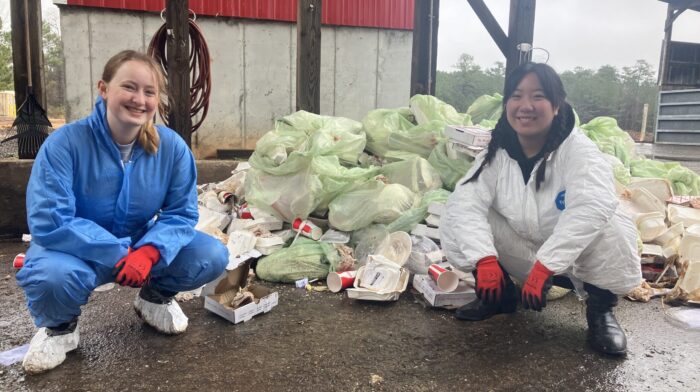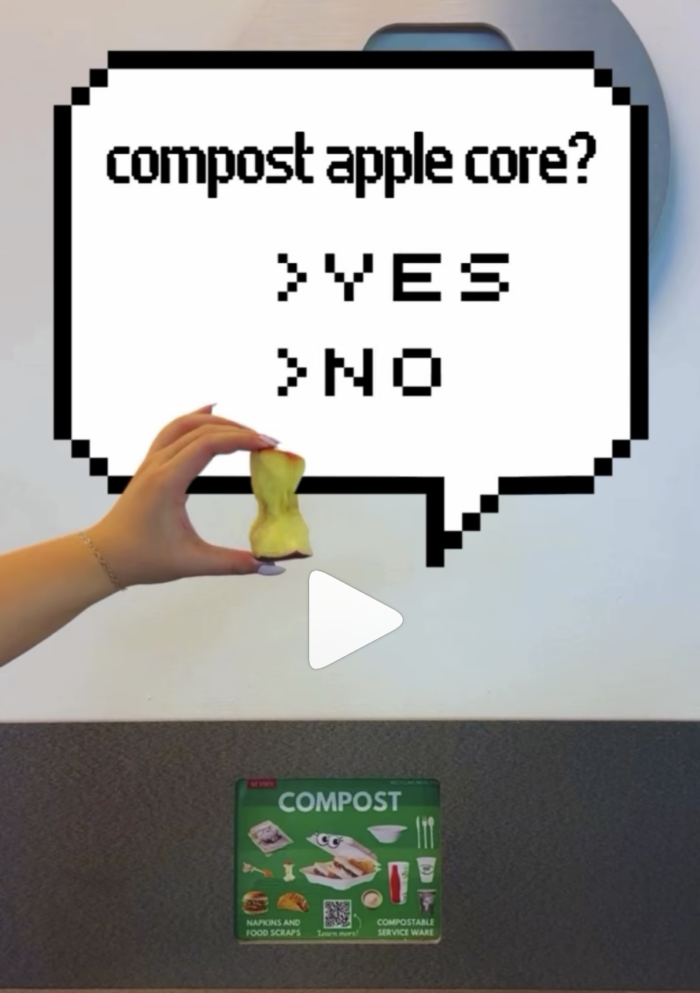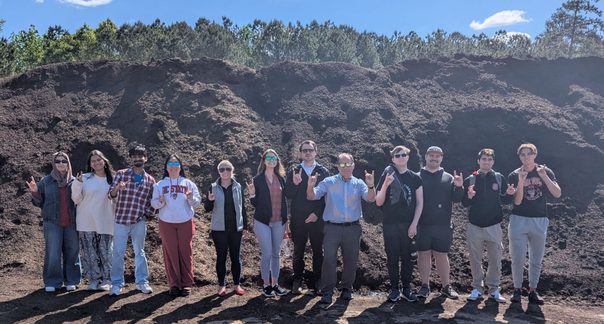What’s New
Spring 2025 has been a whirlwind for the NC State Dining Sustainability Committee! From hosting exciting events to making real strides in sustainable dining, we’ve been busy making a difference. Take a look at what we’ve been up to this semester.
NC State Dining Wins Sustainability Award

We’re excited to share that NC State Dining was awarded the 2025 Sustainability Award for Organization Recipients! The award was announced at NC State’s annual Sustainability Celebration, recognizing our efforts in waste reduction, local sourcing, and sustainable dining practices. Thank you to our team and campus partners for helping us lead the Pack toward a greener future!
Spring Compost Audits

Fountain Dining Hall Audit
Led by Cory Schumacher (Compost Facility Operator), Erin Kohn (Compost Intern) and Meredith Smith (Outreach and Engagement Coordinator), the team spent three hours sorting through 1,770 lbs of post‑service waste. They discovered that mislabeled plastic utensils alone made up 55.6 % of contamination and that 70.2 % of all contaminants were plastic.
On the Oval Food Hall Audit
Conducted by Cory Schumacher, Meredith Smith, Matt Ball (Waste Diversion Coordinator) and student interns Emily Mobley, Nikki Nguyen, and Morgan Starnes, this two‑hour audit of 290 lbs of waste revealed sauce packets (26.6 %) and sauce containers (10.6 %) as the top offenders, with plastics comprising 76 % of total contamination.
Armed with these insights, NC State Dining is partnering with procurement to source only truly compostable serviceware and collaborating with Waste Reduction and Recycling on clearer station signage and hands‑on training for staff and students. These initiatives ensure high‑quality compost for our Agroecology Farm and turn every tray drop‑off into an opportunity to close the loop, transforming audit findings into action and growing a greener Wolfpack community!
Sustainability Focused Events
Farm Feast, April 2: We celebrated North Carolina’s agricultural roots with a focus on sustainability and locally sourced food. North Carolina businesses like Carolina Classics Catfish, Chandler’s Foods, Texas Pete, CACKALACKY and Howling Cow Ice Cream pleased everyone’s tastebuds. Attendees could also learn about sustainable practices on campus through partners like Got to Be NC, the NC State Agroecology Farm and Waste Reduction and Recycling.
Read More >>
View Event Gallery >>
Earth Day Tour: On April 16, NC State Dining hosted a sustainability tour that took students behind the scenes of the campus food cycle—from plate to compost and back again. Fun fact: NC State has its own compost facility! Even more interesting? That compost helps grow the fresh, nutritious produce served up from the NC State Agroecology Farm.
Watch the closed loop in action >>


Seafood Day, April 17: NC State Dining in partnership with NC State Seafood Laboratory hosted a Seafood Dinner fit for a seafood lover’s dream at Fountain Dining Hall. From fresh catches to savory shellfish, we served up a delicious spread inspired by the ocean’s bounty.
Local Fridays: Every Friday, North Carolina produce is featured, from Farmer Foodshare’s network of farms or the Agroecology Education farm. Additionally, other local vendors are highlighted on a rotation: Carolina Classics Catfish, Shipley Beef and Chandler Foods.
Partnership Highlight
 Each year, our long-time partner—the Agroecology Education Farm—grows more than 5,000 pounds of organic produce for NC State Dining. Since spring 2023, the farm has been led by Sara Snyder, a passionate organic farming advocate and former Duke Campus Farm alum. The farm also gives students valuable hands-on experience in sustainable agriculture. Stop by and say hello!
Each year, our long-time partner—the Agroecology Education Farm—grows more than 5,000 pounds of organic produce for NC State Dining. Since spring 2023, the farm has been led by Sara Snyder, a passionate organic farming advocate and former Duke Campus Farm alum. The farm also gives students valuable hands-on experience in sustainable agriculture. Stop by and say hello!
Staff Member Highlight
 Nikki Nguyen is the sustainability intern for NC State Dining. You might’ve spotted her handing out strawberries at our Earth Day table or leading Watch Our Waste Wednesdays—an initiative that teaches students how to sort waste properly, reduce pollution and works to expand campus-wide recycling and composting efforts. [Read the full interview here.]
Nikki Nguyen is the sustainability intern for NC State Dining. You might’ve spotted her handing out strawberries at our Earth Day table or leading Watch Our Waste Wednesdays—an initiative that teaches students how to sort waste properly, reduce pollution and works to expand campus-wide recycling and composting efforts. [Read the full interview here.]
Readings
Check out these articles sourced from NC State Dining and some of our campus partners!
- From NC State Dining: Learn more about Local Fridays
- From University Sustainability Office: Learn more about Campus as a Classroom, a program under which Dining has hosted two interns during the fall 2024 semester
- From University Sustainability Office: Learn about safely storing leftover food
- From University Sustainability Office: Learn more about campus edible gardens with this blog post written by two Campus as a Classroom 2023-2024 interns, including Dining’s sustainability marketing intern